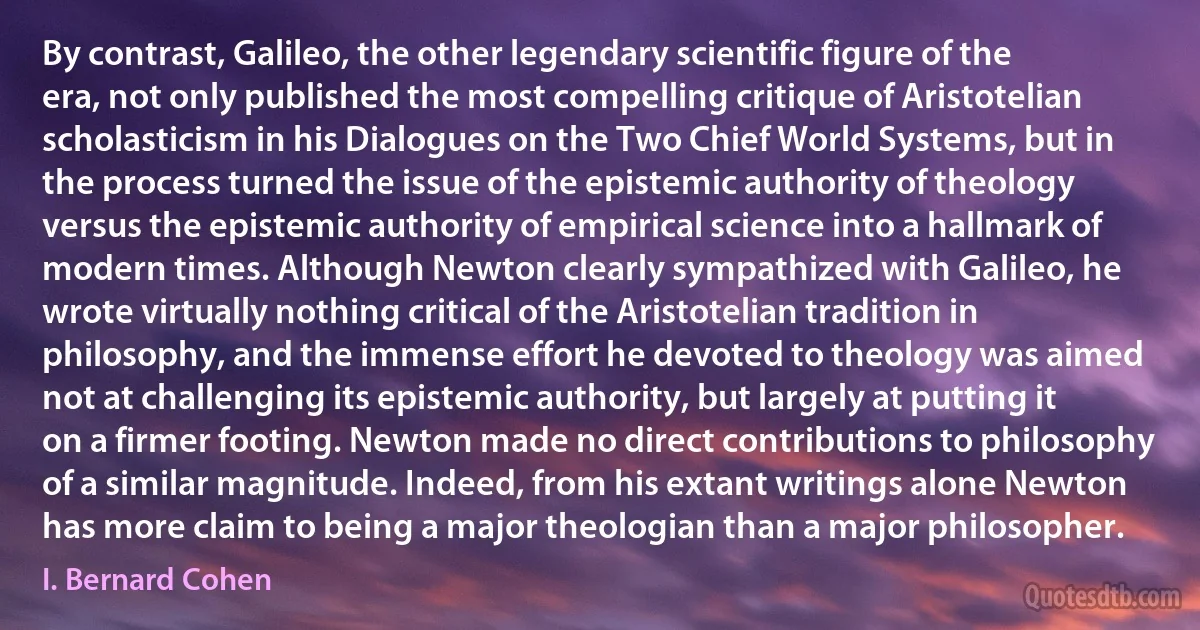
By contrast, Galileo, the other legendary scientific figure of the era, not only published the most compelling critique of Aristotelian scholasticism in his Dialogues on the Two Chief World Systems, but in the process turned the issue of the epistemic authority of theology versus the epistemic authority of empirical science into a hallmark of modern times. Although Newton clearly sympathized with Galileo, he wrote virtually nothing critical of the Aristotelian tradition in philosophy, and the immense effort he devoted to theology was aimed not at challenging its epistemic authority, but largely at putting it on a firmer footing. Newton made no direct contributions to philosophy of a similar magnitude. Indeed, from his extant writings alone Newton has more claim to being a major theologian than a major philosopher.
I. Bernard CohenRelated topics
aristotelian authority challenging chief claim compelling contrast critique effort era legendary magnitude nothing putting science theologian theology times world newton galileoRelated quotes
Like any internationalist, I embrace Scotland's interdependence and the advantages that such interdependence confers. But in international relations - perhaps even more than the economic sphere - there are major advantages to pursuing an independent policy that promotes Scotland's global interests. Indeed it precisely because we live in an interdependent world - one where markets are integrating and information flow is unstoppable - a world where the reality of climate change acts as a daily reminder of our reliance on each other - that independence matters. Interdependence is a welcome fact of modern global politics. What matters in the Scottish national interest - above all else - are the terms on which Scotland engages. The equality of esteem, of authority between nations matters more now than it has ever done.

Alex Salmond
The innovator, however, must in the first place be discontented, he must doubt the value of what he is doing or question the accepted ways of doing it. And secondly, he must be prepared to take fresh paths, to venture into fields where he is by no means expert. This is true, at least, of major forms of innovation; they make it possible for other men to be expert, but are not themselves forms of expertise. Freud was not an expert psycho-analyst; before Freud wrote there was no such thing; he created the standards by which psycho-analysts are judged expert. Neither was Marx an expert in interpreting history in economic terms nor Darwin an expert in evolutionary biology. If a man is trained, purely and simply, to be expert and contented in a particular task he will not innovate; Freud would have remained an anatomist, Marx a philosopher, Darwin a field-naturalist.

John Passmore
Although what is called ‘philosophical speculation' is undoubtedly on the decline, many of the practically minded have not yet freed themselves from a method of reasoning, which, in the last analysis, has its roots in theology and metaphysics. No science which pretends to be exact can accept an untested theory or doctrine; yet even in an exact science there is often an admixture of magic, theology, and philosophy. It is one of the tasks of our time to aid scientific reasoning to attain its goal without hindrance. Whoever undertakes this is concerned not so much with ‘philosophy,' properly speaking, as with ‘anti-philosophy.' For him there is but one science with subdivisions - a unified science of sciences. We have a science that deals with rocks, another that deals with plants, a third that deals with animals, but we need a science that unites them all.

Otto Neurath
While the so-called religious issue is necessarily and properly the chief topic here tonight, I want to emphasize from the outset that we have far more critical issues to face in the 1960 election; the spread of Communist influence, until it now festers 90 miles off the coast of Florida - the humiliating treatment of our President and Vice President by those who no longer respect our power - the hungry children I saw in West Virginia, the old people who cannot pay their doctor bills, the families forced to give up their farms - an America with too many slums, with too few schools, and too late to the moon and outer space. These are the real issues which should decide this campaign. And they are not religious issues - for war and hunger and ignorance and despair know no religious barriers.

John F. Kennedy
Yet science is going to tell you that the only things worth describing are those phenomena that can be repeatedly triggered. This is being these are the only phenomena that science can describe and that's the name of the game as far as they are concerned. But we, to claim our freedom, to take advantage of the tiny moment between immense abysses of unknowability, perhaps death, perhaps other reincarnations, perhaps transitions into other life forms, these things we don't know, but in the moment of being human we have the unique opportunity to figure things out. And I have the faith that it is possible, sometime, somewhere, to have a conversation, perhaps no progress will be made until the ninth hour, but to have a conversation in which reality could be literally pulled to pieces, beyond the point of reconstructing.

Terence McKenna
